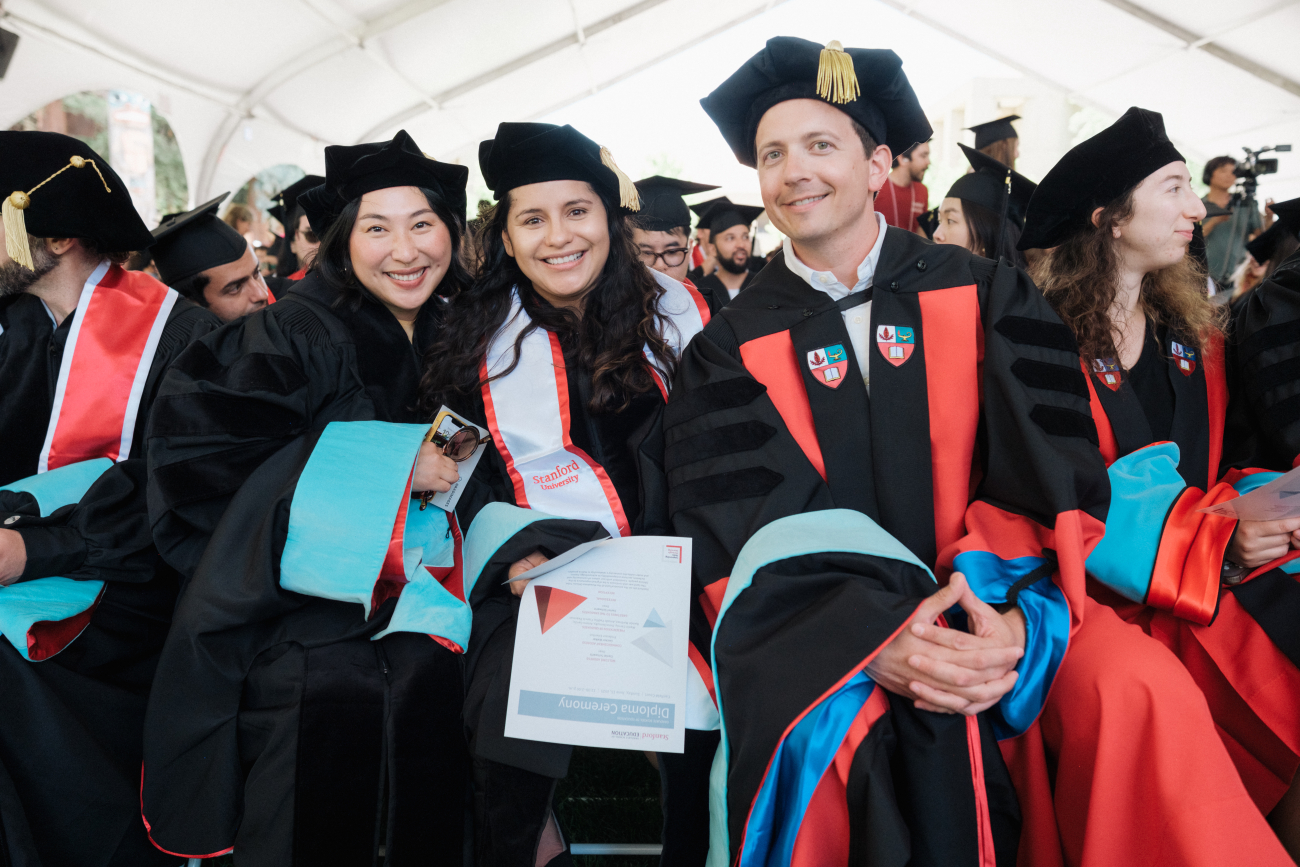
Stanford education graduates urged to be flexible in the face of disruption
Stanford GSE students received their diplomas in a joyous ceremony that honored their perseverance and purpose — and urged them to stay flexible in a rapidly evolving learning landscape.
“There are many winds of change, and they’re very strong,” said Professor Emeritus Decker Walker, PhD ’71, who delivered the commencement address. “You need to be adaptable.”
Walker, an expert in curriculum and instruction who also started the technology in education program at the GSE, shared highlights of his “checkered career” as a high school teacher, professor, and researcher. He emphasized the need to stay open to change as funding for certain projects may evaporate, new education priorities emerge, or technology transforms.
“You have dreams, you have visions, and you have work that you would like to do,” he said. “Just be flexible.”
GSE Dean Dan Schwartz opened the June 15 ceremony by asking the graduates to stand, turn to the audience, and say thank you to their families and friends who supported their education. In return, the families cheered and hollered for their students – clad in their regalia, waving and smiling.
“An advanced degree is about the tolerance of ambiguity over a long timeline, and the only way you can make your way through is because you love and believe in what you’re learning,” Schwartz said.
The GSE conferred 22 doctoral degrees and 140 master's degrees in programs ranging from education data science and learning design technology, to teacher preparation, as well as joint degrees with law, business and public policy.
“I’ve learned so many things about education in the widest sense just by virtue of being part of this super diverse group of people that care about very similar things, but go about addressing them in many different ways,” said Julian Siebert, PhD ’25, who was the GSE’s flag bearer, and the first to receive his diploma, this year.
After graduating, Siebert will be a postdoc scholar with the Multitudes Project, a reading screening tool, at the University of California, San Francisco.
Record number of undergraduates recognized
The GSE also honored undergraduates who completed a minor or honor’s thesis. Nearly 50 Stanford undergraduates attended a ceremony recognizing their achievements on June 13, about double the number of participants of any year prior.
“One of the things that undergraduate students who study with us at the GSE are doing is they’re helping to spread the word to the rest of the undergraduate community that education is an important, status-worthy thing to study and pursue,” said Jennifer Wolf, a senior lecturer at the GSE and director of the education minor.
One such student is Christopher Badillo, who earned a bachelor’s degree in comparative studies in race and ethnicity and received a 2025 Firestone Medal for Excellence in Undergraduate Research for his education honors thesis on school board politics.
“Finding out I won the award for my thesis was such a great moment of perspective on the work I had done and the importance of my own contribution to education politics discourse in this moment,” said Badillo, who intends to pursue a career at the intersection of education policy and politics.
Eleven students plan on becoming classroom teachers, including four students who will enter the Stanford Teacher Education Program (STEP).
“The students who come to us have a strong justice and public service mindset,” Wolf said. “They are interested in using what they learn with us to serve the communities they’re from, solve problems, make the world a better place and I think they come to the GSE because they see us as a place where they can try on that identity as undergraduates and I’m glad about it.”
Foster deep thinking
Walker said cultivating creativity and curiosity are among the goals of education, even as the means by which students learn change.
“I think the need for teachers who can foster deep thinking on the part of the students is absolutely essential,” Walker said. “And researchers, I hope you’ll work on problems that help to support this kind of teaching and learning.”
He added: Don’t be afraid to ask for help. Find – or create – resources that you aren’t readily given. Collaborate. Don’t give up.
Then he ended with a charge: “Go forth and do wonderful things.”



